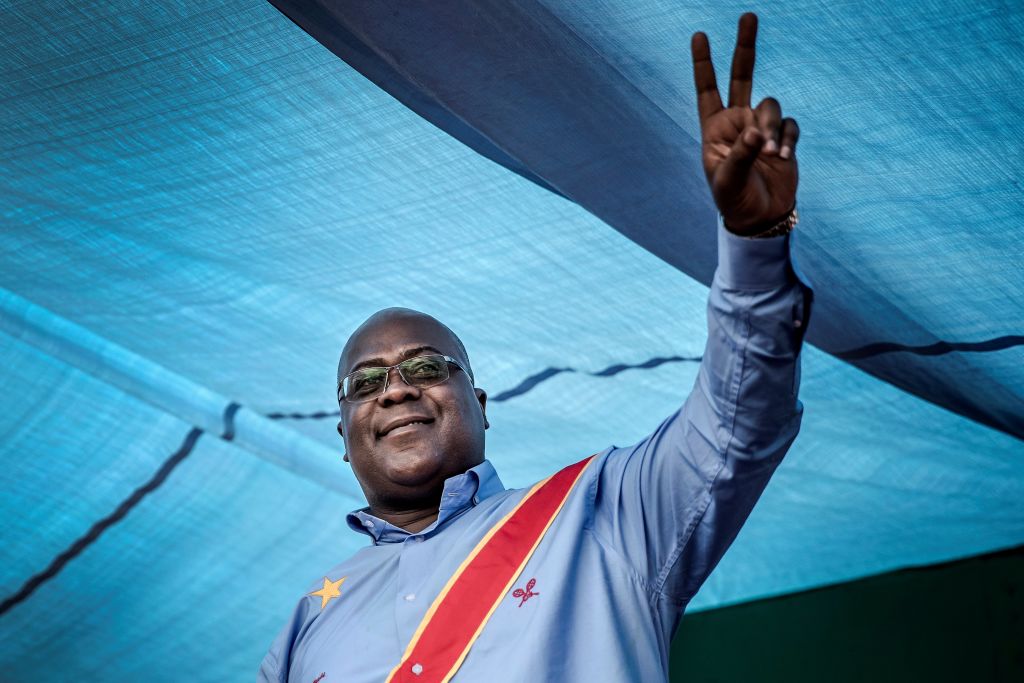Opposition candidate declared Congo's next president. Observers say he's the wrong opposition candidate.


A free daily email with the biggest news stories of the day – and the best features from TheWeek.com
You are now subscribed
Your newsletter sign-up was successful
Early Thursday, election officials in the Democratic Republican of Congo "provisionally" declared opposition candidate Felix Tshisekedi winner of a long-delayed presidential election, setting up the first democratic transfer of power in sub-Saharan Africa's largest county since its independence in 1960. According to the national election commission, Tshisekedi got about seven million votes, narrowly beating another opposition candidate, Martin Fayulu, with 6.4 million votes, and far outpacing Emmanuel Shadary, the hand-picked successor of outgoing President Joseph Kabila, with 4.4 million votes.
Polls before the Dec. 30 election showed Fayulu with a commanding lead, and outside observers and institutions — notably the Catholic Church, which deployed 40,000 election observers — considered him the true victor. The Catholic observers and another domestic election-watching organization said there was widespread irregularities or outright fraud.
Just before the electoral commission named him the runner-up, Fayulu said it's an "open secret" that Tshisekedi had entered a power-sharing agreement with Shandary and the Kabila government. "My response is simple," he wrote: "The Congolese people deserve the truth of the ballot, not another backroom arrangement." He can legally appeal the results to the constitutional court.
The Week
Escape your echo chamber. Get the facts behind the news, plus analysis from multiple perspectives.

Sign up for The Week's Free Newsletters
From our morning news briefing to a weekly Good News Newsletter, get the best of The Week delivered directly to your inbox.
From our morning news briefing to a weekly Good News Newsletter, get the best of The Week delivered directly to your inbox.
Kabila — who took power after his father, Laurant Kabila, was assassinated in 2001 — delayed the elections for two years past when his second and final term was supposed to end in 2016, and analysts say he favored Tshisekedi as his best remaining option because he views him as more pliable and less likely to tackle corruption in Kabila's circle. Still, The New York Times reports, "the election commission's early-morning announcement amounted to a startling admission by the government that Mr. Kabila's candidate had suffered a defeat so big that his government — in power for 18 years — could not simply hand him the presidency without risking widespread violence and international condemnation."
Congolese security forces are bracing for violence and on Wednesday, the U.S. State Department advised all Americans in the country to leave.
A free daily email with the biggest news stories of the day – and the best features from TheWeek.com
Peter has worked as a news and culture writer and editor at The Week since the site's launch in 2008. He covers politics, world affairs, religion and cultural currents. His journalism career began as a copy editor at a financial newswire and has included editorial positions at The New York Times Magazine, Facts on File, and Oregon State University.
-
 6 of the world’s most accessible destinations
6 of the world’s most accessible destinationsThe Week Recommends Experience all of Berlin, Singapore and Sydney
-
 How the FCC’s ‘equal time’ rule works
How the FCC’s ‘equal time’ rule worksIn the Spotlight The law is at the heart of the Colbert-CBS conflict
-
 What is the endgame in the DHS shutdown?
What is the endgame in the DHS shutdown?Today’s Big Question Democrats want to rein in ICE’s immigration crackdown
-
 Witkoff and Kushner tackle Ukraine, Iran in Geneva
Witkoff and Kushner tackle Ukraine, Iran in GenevaSpeed Read Steve Witkoff and Jared Kushner held negotiations aimed at securing a nuclear deal with Iran and an end to Russia’s war in Ukraine
-
 Pentagon spokesperson forced out as DHS’s resigns
Pentagon spokesperson forced out as DHS’s resignsSpeed Read Senior military adviser Col. David Butler was fired by Pete Hegseth and Homeland Security spokesperson Tricia McLaughlin is resigning
-
 Judge orders Washington slavery exhibit restored
Judge orders Washington slavery exhibit restoredSpeed Read The Trump administration took down displays about slavery at the President’s House Site in Philadelphia
-
 Hyatt chair joins growing list of Epstein files losers
Hyatt chair joins growing list of Epstein files losersSpeed Read Thomas Pritzker stepped down as executive chair of the Hyatt Hotels Corporation over his ties with Jeffrey Epstein and Ghislaine Maxwell
-
 Judge blocks Hegseth from punishing Kelly over video
Judge blocks Hegseth from punishing Kelly over videoSpeed Read Defense Secretary Pete Hegseth pushed for the senator to be demoted over a video in which he reminds military officials they should refuse illegal orders
-
 Trump’s EPA kills legal basis for federal climate policy
Trump’s EPA kills legal basis for federal climate policySpeed Read The government’s authority to regulate several planet-warming pollutants has been repealed
-
 House votes to end Trump’s Canada tariffs
House votes to end Trump’s Canada tariffsSpeed Read Six Republicans joined with Democrats to repeal the president’s tariffs
-
 Bondi, Democrats clash over Epstein in hearing
Bondi, Democrats clash over Epstein in hearingSpeed Read Attorney General Pam Bondi ignored survivors of convicted sex offender Jeffrey Epstein and demanded that Democrats apologize to Trump
